Medical Compass: Get a grip on hypertension to reduce your risks
Over 77 percent of hypertension is uncontrolled.
By David Dunaief, M.D.

You would think that, with all the attention we place on hypertension and all the medications in the market that focus on reducing it, we would be doing better in the U.S., statistically.
According to the latest data, almost 120 million U.S. adults, or 48.1 percent of the population, suffer from hypertension (1). Of these, only 22.5 percent have their blood pressure controlled to less than 130/80 mmHg.
For the remaining 92.9 million affected, their risk of complications, such as cardiovascular events and mortality, is significantly higher.
What has the greatest impact on your risk of developing hypertension?
In an observational study involving 2,763 participants, results showed that the top three influencers on the risk of developing high blood pressure were eating a poor diet, with 2.19 times increased risk; being at least modestly overweight, with 1.87 times increased risk; and cigarette smoking, which increased risk 1.83 times (2).
What increases our risk of hypertension complications?
Being significantly overweight or obese, smoking, poor diet, lack of exercise, family history, age, increased sodium, depression, diabetes, low vitamin D, and too much alcohol are some of the factors that increase our risk (3). The good news is that you can take an active role in improving your risk profile (4).
Who is at greater risk of complications, men or women?
One of the most feared complications of hypertension is cardiovascular disease. A study found that isolated systolic (top number) hypertension increased the risk of cardiovascular disease and death in both young and middle-aged men and women between 18 and 49 years old, compared to those who had optimal blood pressure (5). The effect was greatest in women, with a 55 percent increased risk of cardiovascular disease and 112 percent increased risk of heart disease death.
High blood pressure complications were not affected by onset age. Though this study was observational, it was very large and had a 31-year duration.
When is the best time to measure blood pressure?
Measuring blood pressure in the clinic can be useful. However, in a meta-analysis of nine studies, results showed that high blood pressure measured at nighttime was potentially a better predictor of myocardial infarctions (heart attacks) and strokes, compared to daytime and clinic readings (5).
For every 10 mmHg rise in nighttime systolic blood pressure, there was a corresponding 25 percent increase in cardiovascular events.
Does this mean that nighttime readings are superior in predicting risk? Not necessarily, but the results are interesting. The nighttime readings were made using 24-hour ambulatory blood pressure measurements (ABPM).
Masked uncontrolled hypertension (MUCH) is a factor that may increase the risk of cardiovascular events in the nighttime. MUCH occurs in those who are well-controlled during clinic readings for blood pressure; however, their nocturnal blood pressure is uncontrolled. In the Spanish Society of Hypertension ABPM Registry, MUCH was most seen during nocturnal hours (6).
The authors suggest that ABPM may be a better way to monitor those with higher risk factors for MUCH, such as those whose pressure is borderline in the clinic and those who are smokers, obese or have diabetes.
A previous study of patients with chronic kidney disease (CKD) and hypertension suggested that taking at least one antihypertensive medication at night may be more effective than taking them all in the morning (7). Those who took one or more blood pressure medications at night saw a two-thirds reduction in cardiovascular event risk. This could help explain those results.
Do berries help control blood pressure?
Diet plays an important role in controlling high blood pressure. Of course, lowering sodium is important, but what about adding berries?
In a study, 22 grams of blueberry powder consumed daily, equivalent to one cup of fresh blueberries, reduced systolic blood pressure by a respectable 7 mmHg and diastolic blood pressure by 5 mmHg over 2 months (8).
This modest amount of fruit had a significant impact in a small, preliminary, double-blind, placebo-controlled randomized trial. Blueberries increase nitric oxide, which helps blood vessels relax and reduces blood pressure. While the study used powder, it’s possible that an equivalent amount of real fruit could lead to an even greater reduction.
In conclusion, high blood pressure and resulting cardiovascular complications can be scary, but lifestyle modifications, such as making dietary changes and taking antihypertensive medications at night, can have a big impact in reducing your risks.
References:
(1) millionhearts.hhs.gov. (2) BMC Fam Pract 2015;16(26). (3) uptodate.com. (4) Diabetes Care 2011;34 Suppl 2:S308-312. (5) J Am Coll Cardiol 2015;65(4):327-335. (6) Eur Heart J 2015;35(46):3304-3312. (7) J Am Soc Nephrol 2011 Dec;22(12):2313-2321. (8) J Acad Nutr Diet 2015;115(3):369-377.
Dr. David Dunaief is a speaker, author and local lifestyle medicine physician focusing on the integration of medicine, nutrition, fitness and stress management. For further information, visit www.medicalcompassmd.com or consult your personal physician.







